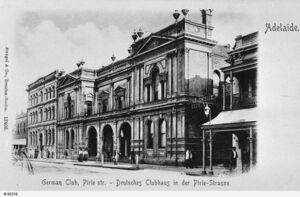Deutsche Verein (1854-1909)
 | |
| Formation | 1855 |
|---|---|
| Location |
|
Der Deutscher Verein, or the German Club, was the first formal club in Adelaide with the aims of promoting and retaining German culture. It was formed after A. F. Cranz left the state and the societies and library that had a home at "The German Castle" had to move elsewhere.
History and description
[This article is based on the Adelaidia article by Jude Elton under a (CC BY-NC 3.0 AU) license and the Wikipedia article under a (WP:CC BY-SA) license. It has been adapted and revised by Benjamin Hollister.]
Der Deutscher Verein was founded on 15 July 1854, at a time when German migrants constituted 7–10% of the non-Aboriginal population of South Australia. The club began meeting in the Hotel Europe in Grenfell Street, but ‘owing to its increasing strength and prosperity’ it sought more extensive accommodation in a building of its own in the mid 1870s. Land was purchased in Pirie Street for £3000 and GR Johnson of Melbourne was commissioned to design the premises. The majestic design in French Renaissance style contained small and large rooms, including a library, billiard room, smoking room, six bedrooms, kitchen and dining room. A meeting room could accommodate up to 400 people. A substantial balcony overlooked the street. A large hall, named Albert Hall, was designed by Bayer & Withall and added to the rear of the building. It accommodated 1500 people. The foundation stone was laid on 19 August 1878 with great ceremony: ‘There was a profuse display of bunting and the block of stone to which such importance is attached was crowned by a handsome garland of flowers’. President of the club, Martin Basedow MP, was handed a tin case containing ‘copies of the leading newspapers of the day; current coins of the realm’ and a document on the formation and membership of the club. The foundation stone was lowered over the case and cemented in by Basedow using a silver trowel. A band played a ‘German national air’ and a choir sang ‘Shepherd’s Sunday Song’ in German. The ‘Song of Australia’ (written by Caroline Carleton, wife of the superintendent of the West Terrace Cemetery, Adelaide with music composed independently by Carl Linger, the inaugural conductor of the Adelaider Leidertafel) was also sung and three cheers were given for the German Emperor. The ceremony was followed later in the evening by a ‘sumptuous spread’ at Hotel Europe attended by 100 members and guests. The clubhouse was opened at 7.30pm on 14 July 1879, coinciding with the twenty-fifth anniversary of the German Club. The portico was festooned with green and decorated with coloured lamps for the occasion. The Concordia band played and the Adelaider Liedertafel sang from the balcony. They were followed by fireworks, while red and green lights shone from the main windows. The club’s president then opened the door with a silver key and a celebratory banquet was served in the assembly room. The German Club continued in these premises until 1899, when it was forced to sell the building to pay for accumulated debts. The German Club that operates today in Flinders Street emanated from the Südaustralischer Allgemeiner Deutscher Verein (South Australian German Association).
The Adelaide German Club was founded on 15 July 1854 by C. Kraegen, F. Schumacher, J. Drechsler, A. Beyer, G. Kopsch, F. May, C. Praehm, J. M. Wendt, J. A. Senn, O. Ziegler, C. Gunther and Uhlmann. One service the German Club provided its members was a Sick Fund, which 1868 became a separate organisation.
After twenty years of holding meetings in hotels (they rented a hall upstairs in the Hamburg Hotel in Rundle Street, then the Europe Hotel, Grenfell Street (each at an intersection with Gawler Place), they had saved enough money to purchased a large allotment, part or all of 87–91 Pirie Street, and in 1878 started building their own magnificent clubhouse at 89 Pirie Street, which was opened in July 1879. They then embarked on construction behind the clubhouse, of Adelaide's Albert Hall, a large concert hall named for the Prince Consort, which was officially opened on 4 October 1880. This has been described as the point at which the club's fortunes began to nosedive.[citation needed]
It had cost a little over £2,000, and was entirely paid for by fund-raising activities, and through every member contributing £1, which was to be repaid, interest free, out of profits. The scheme backfired however: membership dropped dramatically and the focus of those remaining was on repaying the debt, to the detriment of their social and cultural program.
From around 1890 maintenance of the Albert Hall was neglected and at a special general meeting held by the German Freehold Company, Ltd., owners on behalf of the club, accepted the offer of £4,000 by the Salvation Army for the property. From January 1899 the Club met in a house owned by Patrick Gay (the cabinetmaker of Gay's Arcade fame) in Grenfell Street.
The German Club predominantly consisted of the "upper crust" of German society, living in North Adelaide and Walkerville, steeped in fine German literature and classical music, socialising with and even marrying British settlers of the same social strata, and making the club accessible to cultured British Australians. They loosened their ties to the Lutheran Church, and sent their children to parochial schools. Many of their "leading lights" found membership of the Adelaide Club more beneficial to their social and business success, and left the German Club.[citation needed]
The club wound up in 1909.
Presidents
| Name | Term |
| Martin Basedow | 1878 |
| Robert Homburg | 1880 |
| A. Witt | 1888 |
Notable members
Members of the German Club included:
- [[ ]]